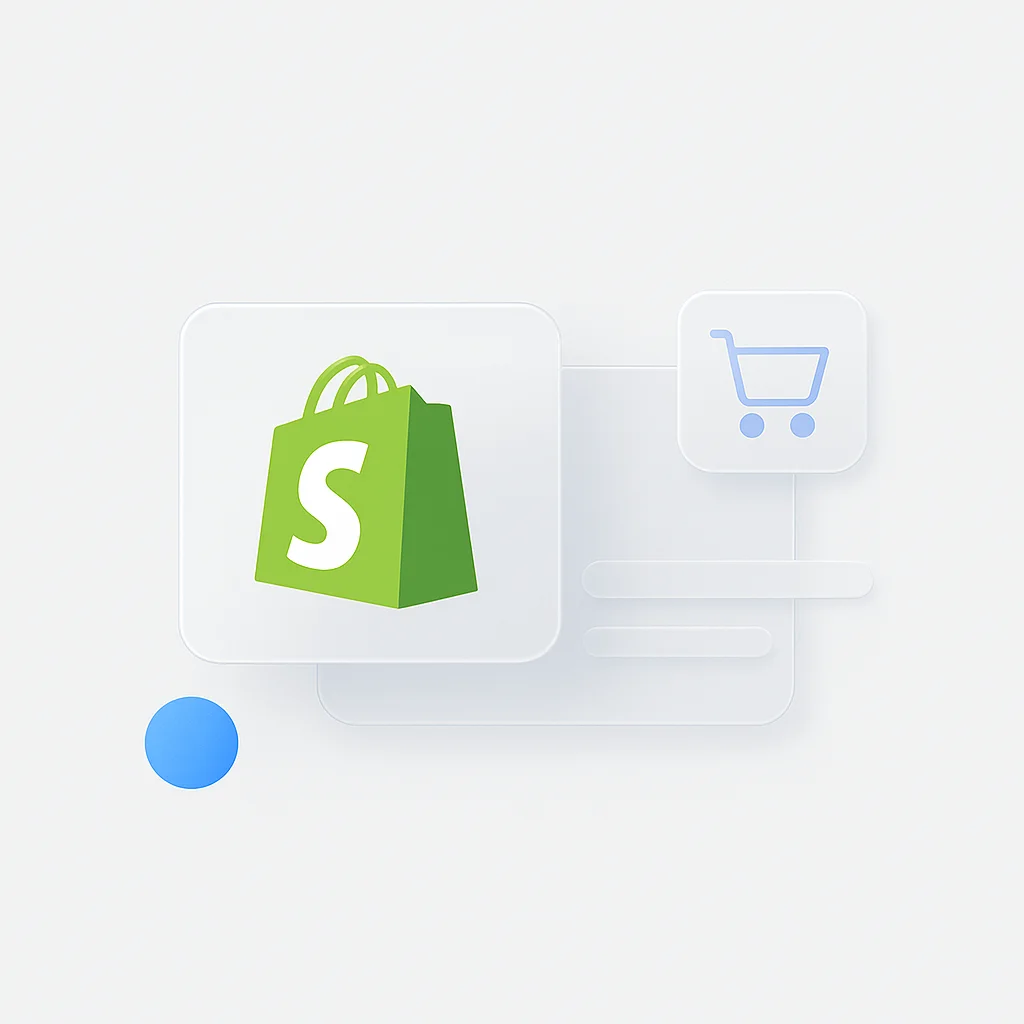According to Statista’s latest market analysis, while Shopify powers over 4 million online stores, rising transaction fees and app costs are pushing merchants to explore more flexible and cost-effective solutions. Whether you’re a startup watching your budget, a scaling enterprise needing more control, or a creative entrepreneur seeking better customization options, this guide reveals the perfect Shopify alternative for your business.

🛍️ What You'll Learn
At a Glance: Top Shopify Alternatives Compared
| Platform | Best For | Starting Price | Transaction Fees | Ease of Use |
|---|---|---|---|---|
|
1. BigCommerce
|
Overall Growth | $29.95/mo | None | ★★★★☆ |
|
2. WooCommerce
|
WordPress Users | Free | Gateway Only | ★★★☆☆ |
|
3. Wix
|
Beginners | $27/mo | None | ★★★★★ |
|
4. Squarespace
|
Creatives & Designers | $23/mo | Varies (0-3%) | ★★★★☆ |
|
5. Ecwid
|
Add-on to Sites | Free | Gateway Only | ★★★★★ |
|
6. Big Cartel
|
Artists & Makers | Free | None | ★★★★★ |
|
7. Adobe Commerce
|
Enterprise & B2B | Free (Open Source) | Gateway Only | ★☆☆☆☆ |
|
8. PrestaShop
|
International (Europe) | Free (Open Source) | Gateway Only | ★★★☆☆ |
|
9. Medusa
|
Headless Commerce | Free (Open Source) | Gateway Only | ★☆☆☆☆ |
|
10. Square Online
|
Retail & POS Users | Free | Gateway Only | ★★★★★ |
Why Consider Shopify Alternatives in 2026?
Rising Costs
- Transaction Fees: 0.5% to 2% extra when not using Shopify Payments
- App Dependencies: Essential features often require paid third-party apps
- Plan Limitations: Basic plan restrictions push upgrades sooner than necessary
Creative Constraints
- Theme Limitations: Liquid templating language can restrict custom designs
- App Store Lock-in: Reliance on marketplace apps for core functionality
- SEO Challenges: Limited URL structure and blog customization options
Technical Considerations
- Data Ownership: Platform lock-in concerns with hosted solutions
- API Limitations: Restrictions on custom integrations and automation
- Scalability Costs: Enterprise features require expensive Plus plan
The Best Shopify Alternatives by Category
Category 1: The All-Round Powerhouses
1. BigCommerce
As Shopify’s biggest direct competitor, BigCommerce stands out with its feature-rich platform and zero transaction fees policy, making it a compelling choice for growing businesses.
Key Features:
- Zero transaction fees across all plans
- Built-in advanced features
- Multi-channel selling capabilities
- Enterprise-grade SEO tools
Pros:
- No transaction fees on any plan
- Comprehensive built-in features reducing app dependency
- Strong SEO capabilities out of the box
- Excellent multi-channel selling support
- Regular platform updates and improvements
Cons:
- Steeper learning curve than Shopify
- Sales volume caps can force plan upgrades
- Limited free theme selection
- More complex initial setup
💰 Pricing:
- Standard: $29.95/mo
- Plus: $79.95/mo
- Pro: $299.95/mo
- Enterprise: Custom pricing
Perfect For: Serious e-commerce stores, established businesses, and those who want to scale without worrying about transaction fees.
2. WooCommerce
A free WordPress plugin that offers unparalleled customization and complete control over your e-commerce store, perfect for businesses already using WordPress.
Key Features:
- WordPress integration
- Unlimited customization options
- Extensive plugin ecosystem
- Complete data ownership
Pros:
- 100% customizable platform
- Huge library of themes and plugins
- No monthly platform fees
- Full data ownership
- Strong community support
Cons:
- Requires self-hosting setup
- Technical knowledge needed
- Security management responsibility
- Ongoing maintenance required
💰 Real Costs:
- Core Plugin: Free
- Hosting: $10-100/mo
- Domain: ~$15/year
- Premium Themes: $50-200
- Essential Plugins: $0-500+/year
Perfect For: WordPress users, businesses wanting complete creative control, and tech-savvy entrepreneurs.
Category 2: Best for Ease of Use & Small Businesses
3. Wix
A user-friendly platform with an intuitive drag-and-drop builder, perfect for those new to e-commerce.
Key Features:
- Drag-and-drop builder
- All-in-one solution
- Built-in marketing tools
- Mobile optimization
Pros:
- Extremely easy to use
- Beautiful template selection
- Strong built-in features
- Affordable entry-level plans
- Excellent customer support
Cons:
- Limited scalability for large inventories
- Can’t switch templates after launch
- Basic e-commerce features
- Some design limitations
💰 Pricing:
- Business Basic: $27/mo
- Business Unlimited: $32/mo
- Business VIP: $59/mo
Perfect For: Small businesses, solopreneurs, restaurants, and service-based businesses that also sell products.
4. Squarespace
Known for its award-winning templates and focus on aesthetics, Squarespace delivers a premium design-focused e-commerce experience.
Key Features:
- Award-winning templates
- Built-in image editing
- Integrated blogging platform
- Professional portfolio tools
Pros:
- Stunning design quality
- Intuitive editor interface
- Strong blogging capabilities
- Seamless portfolio integration
- Professional marketing tools
Cons:
- Limited payment gateways
- Basic e-commerce features
- Less flexibility than dedicated platforms
- Higher learning curve for customization
💰 Pricing:
- Business: $23/mo
- Commerce Basic: $27/mo
- Commerce Advanced: $49/mo
Perfect For: Artists, designers, photographers, and brands where visual presentation is paramount.
Category 3: The Free & Budget-Friendly Options
5. Ecwid
A unique e-commerce solution that works as a “widget” you can add to any existing website, making it perfect for adding shopping capabilities to your current site.
Key Features:
- Website integration widget
- Multi-platform selling
- Automated tax calculation
- Mobile point of sale
Pros:
- Generous free-forever plan
- Easy integration with existing sites
- Social media selling tools
- Simple store management
- Multi-language support
Cons:
- Limited features on free plan
- Basic design customization
- Advanced features require upgrades
- Limited SEO options
💰 Pricing:
- Free: 0-10 products
- Venture: $14.99/mo
- Business: $29.99/mo
- Unlimited: $99.99/mo
Perfect For: Those with an existing website or blog who want to add e-commerce functionality without a complete redesign.
6. Big Cartel
A niche platform designed specifically for artists and makers selling a small number of unique products.
Key Features:
- Artist-focused platform
- Simple store management
- Built-in themes
- Basic analytics
Pros:
- Simple and straightforward
- Free plan available (5 products)
- Artist-focused community
- No transaction fees
- Mobile app included
Cons:
- Very limited features
- Basic customization options
- Not suitable for large catalogs
- Limited payment options
💰 Pricing:
- Gold (Free): Up to 5 products
- Platinum: $9.99/mo (50 products)
- Diamond: $19.99/mo (500 products)
Perfect For: Artists, bands, and creators selling a small collection of unique items.
Category 4: The Open-Source & Developer-Focused Solutions
7. Adobe Commerce (Magento Open Source)
The go-to platform for large businesses needing ultimate power and scalability, offering enterprise-grade features and unlimited customization.
Key Features:
- Enterprise-grade architecture
- Advanced B2B features
- Global scaling capabilities
- Complex catalog management
Pros:
- Infinitely scalable
- Handles large catalogs
- Extensive customization
- Strong B2B features
- Global community support
Cons:
- Extremely complex setup
- Requires development team
- High maintenance costs
- Significant hosting needs
💰 Total Cost Consideration:
- Open Source: Free
- Hosting: $200-1000+/mo
- Development: $50-150/hour
- Extensions: $0-1000+ each
Perfect For: Enterprise-level businesses, B2B companies, and brands with highly custom needs and significant budgets.
8. PrestaShop
A popular open-source platform with strong European presence, offering a good balance of features and usability.
Key Features:
- Multi-language support
- International commerce tools
- Extensive module marketplace
- Strong European compliance
Pros:
- Free core software
- Large module marketplace
- Excellent multi-language support
- Strong European presence
- Active community
Cons:
- Variable add-on quality
- Technical setup required
- Self-hosted maintenance
- Learning curve for beginners
💰 Total Cost Consideration:
- Core Software: Free
- Hosting: $10-100/mo
- Domain: ~$15/year
- Premium Modules: $50-200+ each
Perfect For: Small to medium-sized businesses, especially those with an international customer base in Europe.
9. Medusa
A modern, developer-first headless commerce platform offering ultimate flexibility and customization.
Key Features:
- Headless architecture
- Modern tech stack (Node.js)
- API-first approach
- Custom frontend options
Pros:
- Ultimate flexibility
- Fast performance
- Modern development
- Custom frontend options
- Scalable architecture
Cons:
- Requires development expertise
- Not for non-technical users
- Complex initial setup
- Limited pre-built themes
💰 Cost Structure:
- Core Platform: Free & open-source
- Development: $80-150/hour
- Hosting: $50-500+/mo
- Infrastructure: Custom pricing
Perfect For: Developers and businesses wanting to build a completely custom, decoupled e-commerce experience.
10. Square Online
A seamless solution for businesses that want to integrate their physical and online stores using Square’s popular POS system.
Key Features:
- POS integration
- Real-time inventory sync
- Built-in payment processing
- Restaurant features
Pros:
- Excellent POS integration
- Automatic inventory sync
- Free plan available
- Built-in payment processing
- Food service features
Cons:
- Basic e-commerce features
- Limited design options
- Square payment lock-in
- Basic SEO capabilities
💰 Pricing:
- Free: $0/mo (2.9% + 30¢ per transaction)
- Professional: $12/mo
- Performance: $26/mo
- Premium: $72/mo test
Perfect For: Restaurants, cafes, and retailers who already use or plan to use the Square POS system.
How to Choose Your Perfect Shopify Alternative
Consider Your Business Type
- Small Boutique: Big Cartel or Squarespace
- Growing Brand: BigCommerce or WooCommerce
- Enterprise/B2B: Adobe Commerce or Medusa
- Omnichannel: Square Online or BigCommerce
Evaluate Technical Comfort
- Non-Technical: Wix, Squarespace, Square Online
- Some Experience: BigCommerce, Ecwid
- Technical Teams: WooCommerce, Adobe Commerce, Medusa
Budget Considerations
- Startup Budget: Wix, Big Cartel, Square Online
- Growth Focus: BigCommerce or WooCommerce
- Enterprise Needs: Adobe Commerce or Medusa
When you’re evaluating Shopify alternatives, also weigh your fulfillment model. Print-on-demand lets you launch custom products with zero inventory, automate dropshipping, and test niches quickly across WooCommerce, BigCommerce, and Wix. Choose providers with $0 setup fees, fast sample ordering, and native integrations to reduce total cost of ownership and scale efficiently,” says Saulius Meilutis, CEO of Podbase, a leading print-on-demand platform.
Frequently Asked Questions
What is the best free alternative to Shopify?
WooCommerce is the most powerful free alternative, though it requires hosting costs. For a truly free start, consider Square Online or Big Cartel’s free plan. Remember to factor in additional costs like hosting, domain, and essential plugins.
Is WooCommerce better than Shopify?
WooCommerce offers more flexibility and control but requires more technical knowledge. Shopify is easier to use but has higher ongoing costs. The “better” choice depends on your specific needs:
-
Choose WooCommerce if you:
- Want complete control over your store
- Have technical resources available
- Already use WordPress
- Need extensive customization
-
Stick with Shopify if you:
- Prefer an all-in-one solution
- Want easier setup and maintenance
- Need robust out-of-box features
- Value 24/7 support
Which Shopify alternative has the lowest transaction fees?
BigCommerce charges no transaction fees beyond payment processor rates. WooCommerce and Adobe Commerce also have no platform fees, but you’ll still pay payment gateway fees. Consider these factors:
- Platform Fees: What the e-commerce platform charges
- Payment Gateway Fees: Standard credit card processing fees
- International Fees: Additional costs for cross-border sales
- Currency Conversion: Fees for multiple currencies
Can I migrate my store from Shopify to another platform?
Yes, most platforms offer migration tools or services. Here’s what you need to know:
-
Data to Migrate:
- Product catalog and images
- Customer information
- Order history
- Blog posts and pages
- SEO settings and redirects
-
Migration Tools:
- BigCommerce’s built-in Shopify migrator
- WooCommerce migration plugins
- Third-party migration services
- Custom data export/import
Pro Tip: Always backup your data before starting any migration process.
What is the easiest e-commerce platform to use?
Wix and Square Online are the most user-friendly for beginners, offering:
- Intuitive drag-and-drop interfaces
- Step-by-step setup guides
- Pre-built templates
- Integrated payment processing
- Automated tax calculations
How do I choose between hosted and self-hosted platforms?
Consider these factors when deciding:
Hosted Platforms (BigCommerce, Wix):
- Easier setup and maintenance
- Included hosting and security
- Regular automatic updates
- Limited customization
- Higher monthly costs
Self-Hosted Platforms (WooCommerce, Medusa):
- Complete control and flexibility
- Lower recurring costs
- More technical responsibility
- Custom hosting required
- Security management needed
What about international selling?
For international e-commerce, look for these features:
- Multi-language support
- Multiple currency options
- Local payment methods
- Tax compliance tools
- International shipping options
How important is marketplace integration?
Consider your sales channels:
-
Essential for:
- Multi-channel sellers
- Amazon/eBay integration
- Social media selling
- Marketplace expansion
-
Features to Look For:
- Inventory sync
- Order management
- Pricing rules
- Analytics integration
Ready to Transform Your Online Store?
Make the switch to a platform that better serves your business needs and growth goals.
Making the Switch: Your Action Plan

1. Evaluate Your Needs
- Document current pain points with Shopify
- List must-have features and integrations
- Consider future growth requirements
- Assess technical resources available
2. Calculate Total Costs
- Monthly platform fees
- Transaction fees
- Essential apps and plugins
- Development costs
- Migration expenses
3. Plan Your Migration
- Export Shopify data
- Map data to new platform
- Test migration process
- Plan for downtime
- Prepare SEO redirects
4. Test Thoroughly
- Product management
- Order processing
- Payment systems
- Shipping integration
- Customer experience
Additional Resources
Learning Materials
- Platform documentation
- Migration guides
- SEO best practices
- Security guidelines
Support Options
- Community forums
- Platform support
- Developer resources
- Migration services
Related Tools
Quick Decision Guide
For Small Businesses:
- Wix or Square Online for simplicity
- Big Cartel for artists and makers
- Squarespace for design-focused brands
For Growing Brands:
- BigCommerce for scalability
- WooCommerce for flexibility
- Ecwid for multi-channel selling
For Enterprise:
- Adobe Commerce for complete control
- Medusa for headless commerce
- BigCommerce Enterprise for B2B
Remember to regularly review your platform choice as your business evolves and take advantage of free trials to ensure the perfect fit.
Conclusion: Finding Your Perfect Platform
The best Shopify alternative isn’t about choosing the most popular or feature-rich platform—it’s about finding the solution that aligns with your business needs, technical capabilities, and growth plans. Whether you’re a small boutique looking for simplicity with Wix, a growing brand needing scalability with BigCommerce, or an enterprise requiring ultimate control with Adobe Commerce, there’s a platform ready to support your e-commerce journey.






